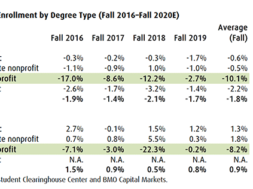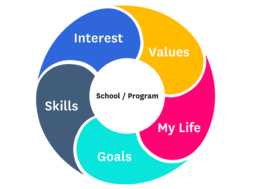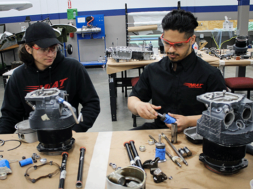
7 Characteristics of a Rock Star Rep and How to Transfer Those Attributes to the Rest of Your Team
By Gregg Meiklejohn, Co-founder/CEO, and Joe Girard, Director of Admissions Performance Institute, Enrollment Resources Inc.
Enrollment management has changed forever;
- We have a more informed consumer than ever before who, due to online education delivery, have many options to pursue.
- Even though prospective students are more informed than ever before, they are also more misinformed. Reps must now first “unspool” what a prospective student has learned, casting out inaccuracies and resetting the admissions process from scratch, without offending anyone in the process.
- Advancements in Lead Management Software has created an unfamiliar world for reps.
For many schools, more leads, less meaningful dialogue, and more “stuff” to do every day have created an exhausted, emotionally flat admissions culture. Add to all this the increasing regulatory pressure, and it’s no wonder that admissions teams are feeling burnt out. Most schools have Rockstar Reps consistently converting at high levels in spite of all of the externals they must deal with because there are specific actions these reps all routinely undertake. There are ways a school can efficiently transfer these actions or ways of work to new reps and to those who have stalled out, thus raising the overall performance bar.
1) Rockstar Admissions Reps have a learning mindset
Rockstar Reps are coachable and adaptable. Mediocre reps often have the arrogant, know-it-all mindset of “That’s just how we’ve always done it before.”
In “Subliminal” by Leonard Mlodinaw, he discusses that our brains have two ways of thinking: we can either think like a scientist or a lawyer. The scientist part of our brain looks for patterns, tests theories, and pursues the truth. The lawyer part of our brain starts with a conclusion and does everything it can to support that conclusion, while at the same time working hard to disprove anything that doesn’t support it. Rock Star Reps think like scientists, mediocre reps think like lawyers.
We feel the solution is not about communications or motivational training, it is about giving reps permission to split test what they say and write and how they sequence their communication. Through trial and error one can’t help but improve conversion rates. This is how it works in a testing lab. You can stop reading this article and take away this insight and significantly increase your enrolment revenues…but why stop?
2) Rock Star Admissions Reps take 100 percent ownership of their results and GET THINGS DONE
Unlike most reps, top producers relentlessly focus on high value activities. School leaders will often frame the admissions agenda as an outcome; “We need 10 more students this month” or “We need to fill up this class.” Mediocre reps react to this top down stuff, Rock Star Reps ignore it, knowing that it’s their focus on high leverage activities that will drive results.
The high performers know their numbers and know how to stay in control by understanding where and when they need to make adjustments. If they have a goal of 10 students in a month, they know how many appointments lead to those enrollments, how many conversations lead to appointments, and how many inquiries they need to generate those appointments. They also know how far out from a given start date they need to pay attention to numbers that aren’t on track. Rock Star Reps don’t make excuses on “why they couldn’t,” but instead make plans on “how they will,” constantly reverse-engineering their work plan, embracing metrics.
Here is another idea: utilize a point system. Assign 80 points a day as a goal for each rep; 20 points for a meeting, 10 points to organize a meeting and 1 point for each reach out by email or phone message. Zero points are given for administrative or busy work. Reps who follow this system or a version of it improve the odds of high performance by focusing on valuable activities.
3) Rock Star Admissions Reps have the courage to qualify
Mediocre reps are all about persuasion and “show and tell” communication. This is how schools have been getting in trouble with regulators, as some schools say, with an “asses in classes” mentality. Top performers stay in the moment and stay in the question until they are absolutely sure the prospective student is a right fit for the school. This appreciative inquiry represents 80 percent of the Admissions Value process. If student and rep are both feeling sure that the career and school dynamics are good fit by way of an objective exchange of information, the rest is relatively easy.
Mediocre reps often feel like they have become “experts,” and to a degree that’s true. The outcome? They rush to solve problems, anticipate answers, and provide product information way too soon.
High performers resist the urge to solve and instead ask and answer lots of great questions. They work hard to understand the current reality of the prospective student, help map out goals and present a clear and objective view of the pros and cons of the career they are considering training for. They work to get a clear picture, help the prospective student frame their OWN challenges, and establish objectively if there is even enough value for a prospective student to proceed to a tour and education plan. They have the courage to walk away.
4) Rock Star Admissions Reps position themselves as a strategic resource, rather than a vendor
Mediocre reps fall into the trap of becoming simply a source of information. Rock Star Admissions Reps know how to quickly take control and create a proper structure where quality conversations can happen. The admissions rep controls the structure, the prospective student, and the content within the structure.
Top performers ensure they are positioned as a trusted adviser versus a vendor. It’s not about ego, it’s about empathy and establishing a type of energy that is supportive and full of understanding, rather than trying to build a personal brand or whatever catch phrase is popular these days. In other words; a quiet, low profile rep steeped in empathetic qualities is much more valuable to a school than those who are self-aggrandizing and seeking a high profile.
5) Rock Star Admissions Reps are willing to advance the admissions process
Reality dictates people sometimes need help making decisions. We’d argue it is a rep’s moral obligation to help others take an action either deeper into the admissions process or out the door.
Reps understand the admissions process; prospective students don’t. Mediocre reps tend to keep the admissions process murky while trying to influence and push deals along. It is our view that if a rep needs to resort to influence and pushing it is a signal they have either lost something in the qualification phase of the process, or the prospective student is not sure where she is being dragged. A top performer will first lay out in detail the admissions process and gain agreement in advance. Stalls in the process are merely explorations the rep and student solve as a team, circle back and requalify. Top producers establish themselves as trusted advisers so the process flows well. Commitments are made incrementally and both student and rep celebrate each one along the way.
6) Rock Star Admissions Reps are subject matter experts
Rock Star Admissions Reps take the time to develop a deep understanding of their programs. They not only understand the technical aspects of their program offerings, but also how the skills are applied in the real world as well as why that field is exciting, even including where pitfalls lie.
Top producers will make sure they research ongoing trends with employers, graduates, and instructors about all facets of their programs. They want to know how it all works and all about the types of exciting things graduates will do on the job. They remain curious about what skills and attitudes are important, what it takes to succeed in the field, and create first-hand, multi-directional knowledge. With all of this knowledge at hand, reps can better serve their students. As a bi-product, referrals tend to follow these folks around. Ask your reps to make a couple of field calls to employers each week.
7) Rock Star Admissions Reps are 100 percent authentic, right away
Mediocre reps tend to either move into transactional mode on first point of contact calls, or let the prospective student buffet them about. Prospective students usually hang reps with a nasty stereotype; manipulative, sleazy, totally passive, salesish…pick your dysfunction. Mediocre reps have trouble getting to an authentic place with a prospective student quickly and subsequently kind of blow up the call, further perpetuating the judgements.
Top producers move to an authentic place immediately. They eliminate sales prejudice and reframe the relationship. Many use a tactic imported from labour negotiation best practices called setting the agenda. Before management and labour unions start, they first negotiate the process or agenda they will follow, which results in better outcomes. This is akin to shining a bright light down a dark alley, alleviating anxiety all around. Top producers use tactics like this to create an agenda for every call and meeting they initiate. Negotiating the process correctly frames the rep as an authentic, transparent and trusted adviser.
How can you transfer Rock Star Reps’ attributes to your team?
You might want to create a simple graph with your reps names listed on the X axis and the seven attributes listed on the y axis. Next, plot the graph based on your assessment of your admissions staff against the Rock Star Rep attributes. How closely aligned are your reps with these seven attributes? Where do you see the gaps?
| Poor | OK | Good | Great | |
| Learning Mindset | Mike | – | Sally | – |
| Ownership | – | Mike | – | – |
| Courage to Qualify | – | Sally | – | Mike |
| Strategic Resource | – | – | Sally | – |
| Influence | – | Mike | – | Sally |
| Subject Expert | – | – | Mike | Sally |
| Authentic | Mike | – | – | Sally |
Now with a sense of things, we can look at how to transfer top performing attributes or ways of work to others where there may be holes in their game. This has traditionally been the domain of admissions training but we know information retention from training is notoriously low. If you want to build a winning team, here are eight tactics you might consider using:
- Profile your Rock Star Rep and hire to said profile. Build an ideal Admissions Rep profile and work on finding potential employees who fit that profile. Find the right mix in your hiring process that will reflect success. Eliminate mediocre reps at the hiring process, so you don’t have to unspool a bad arrangement later. Consider benchmarking using 2-3 different systems; Myers Briggs and DISC profiling come to mind, or build a survey out of the attributes identified in this article. Consider contacting a company such as Muno, Summers and Associates for more information on this topic.
- Establish best practices. Create an inventory of the best tools, questions or insights reps are using and establish a best practice playbook as a benchmark for all reps to work from. Work as many of the best practices into a job description as possible so it is documented as required behaviour.
- Split-test reps’ ways of work against “the control.” Bring in the best practices of Direct Response Marketing into the admissions process improvement. Your existing best practice in Direct Response parlance is known as “the control.” The game is now to have admissions staff “split test” new ideas and protocols with an eye to beating the control. Rather than running admissions training events, run small, understated process improvement labs. The trial and error work will either beat the control or not. Either way, it’s an admissions victory. Create the room for people to try new tests as long as they are working within a prescribed compliant framework. As an aside, reps love this work as it adds a layer of meaning to their day. DOAs love this because it is a way to open up “know it all” reps to better ways of work.
- Tight-loose-tight. When you start a testing process with your reps, establish a benchmark and document what is specifically being done to reach that result. This establishes a tight starting point. Next, give the rep freedom to “try and track” different approaches. That’s loose. Then it’s crucial that you track the results and compare against the benchmark. That’s tight. Simple… tight-loose-tight.
- Follow best practices or get permission to test new ideas. Within higher Education, there is regulatory scrutiny to deal with. We must be mindful that when a prospect becomes a student they become part of the school’s product. In other words, a school’s reputation is only as strong as the graduate pool representing them out in the world. For these reasons, the admissions rep must be consistent in running the agreed-upon admissions process. It must be nonnegotiable. In order to allow a rep to test a better approach, have it documented and run like a pilot project with clear parameters. This is how best practice testing can be managed effectively.
- Establish a testing culture. The admissions testing process is full of course corrections and errors. It only takes a few instances where employees are criticized for making mistakes before they walk away from process improvement. A testing culture must be encouraged, and supported for it to be successful long term. When you have everyone buying into testing, growth accelerates quickly.
- When should a rep be asked to succeed elsewhere? Sometimes, for the reasons above, a school needs a firm structure when it comes to the admissions process. You manage processes, not people, except when the admissions rep refuses to follow the established process or negotiates doing some process improvement testing. A power struggle between the established process and rep? Process’ win is 100 percent of the time. What about the naturally talented reps that don’t follow best practices? I’d argue the same rules apply; you can’t scale on black magic and regulators don’t care. Reps that then buy into and contribute to the admissions structure get resentful. As they say in hockey: there’s no I in Team. Admissions structures can be loose enough where reps can freely express their personality, but the structure needs to be followed by everyone for the good of the school.
Ultimately, what you want to encourage and foster is the development of a learning culture and a learning organization. It takes time, but if everyone is constantly testing and learning, your business will always be able to adapt to changes in the market, serve your customers well, and continue to grow.

Joe Girard , spent more than 14 years in private education as a top performing Admissions Advisor, Manager, Strategic Director, and Corporate Trainer. He credits his success (one year doing more than $4M individually in Admissions) to a relentless focus on process, personal development, and understanding human behavior. His passion has always been about taking personal accountability to help students succeed and make an impact in the community.
Contact Information: Joe Girard // Director of Admissions Performance Institute // Enrollment Resources Inc. // 250-391-9494 (PST) // joe@enrollmentresources.com

Gregg Meiklejohn , specializes in strategic marketing. He is an expert in branding businesses through online and traditional public relations tactics. Gregg developed the award winning program Knowledge Communities, which has consistently given clients massive returns at pennies on the dollar (when compared to advertising). He is our company’s Scenario Planner, analyzing and calling industry trends before they emerge into public view. Gregg has over 20 years of marketing experience and frequently delivers workshops and teaching sessions via Webinar and at conferences North America wide.
Contact Information: Gregg Meiklejohn // Co-founder / CEO // Enrollment Resources Inc. // 250-391-9494 (PST) // Gregg@enrollmentresources.com
References
1. “(The) Ultimate Contact Strategy: How to Use Phone and Email Contact for Contact and Conversion Success.” Velocify Whitepapers and EBooks Library. Velocify.com. Web. 8 Jan. 2016.
2. College Access, Initial College Choice and Degree Completion (2015). National Bureau of Economic Research. © 2015 by Joshua Goodman, Michael Hurwitz, and Jonathan Smith. All rights reserved.
3. BenMessaoud, F. & Gormley, S. School Counselor Focus Group. December 21, 2015. Raw data. Chicago, IL.










